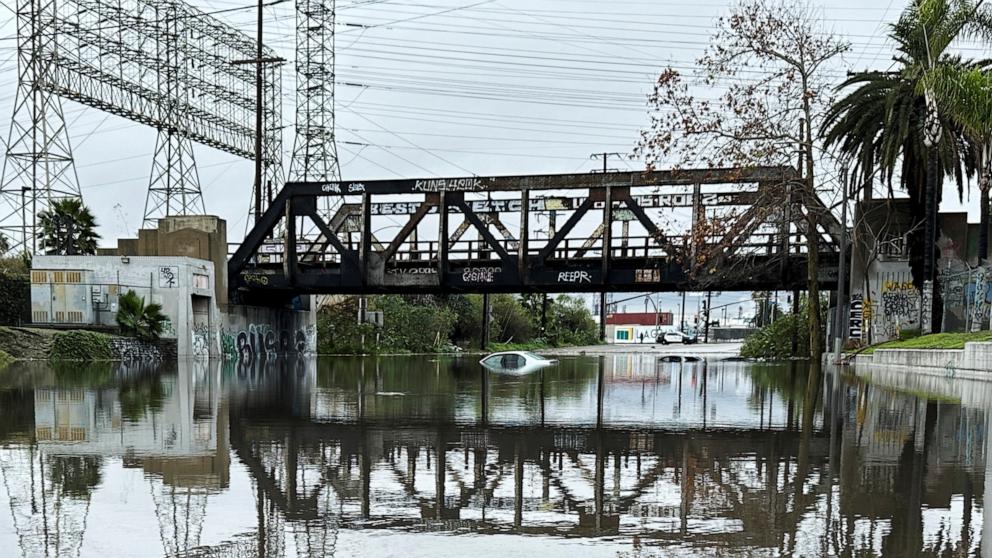


Dangerous weather conditions are affecting nearly the entire state of California over the coming days.
A second round of atmospheric rivers is bringing even more rain and flooding to Southern California in less than a week, exacerbating life-threatening flooding in the region for tens of millions of residents.
On Sunday afternoon, Gov. Gavin Newsom issued a state of emergency for Los Angeles, Orange, Riverside, San Bernardino, San Diego, San Luis Obispo, Santa Barbara and Ventura counties.
"The emergency proclamation includes provisions authorizing a California National Guard response if tasked, facilitating unemployment benefits for impacted residents, and making it easier for out-of-state contractors and utilities to repair storm damage," a statement from the governor's office read.
The system is forecast to be one of the most significant storms in state history, bringing the threat of flash flooding possible from Santa Barbara to Los Angeles, as well as heavy snow and wind in the mountains. Widespread power outages, roadway flooding, mudslides and the likelihood of numerous swift-water rescues are anticipated, according to the National Weather Service.
A flood watch has been issued for a large swath of the Golden State -- from Redding to Sacramento, San Francisco, Los Angeles and San Diego -- affecting 40 million people.
There is a high risk of excessive rainfall for much of Santa Barbara, Ventura and Los Angeles counties. This indicates a 70% risk of meeting life-threatening flash flood rainfall conditions, according to the NWS. Severe and widespread flash floods are expected in the area, even in places that don't normally experience flash flooding.
MORE: California braces for life-threatening storm expected to bring flooding, mudslide threatSome of the regions expected to receive the brunt of the moisture are already inundated from the last system.
Santa Barbara, where evacuation orders have been issued, has received 300% of its normal rainfall for this time of year in the last seven days alone. The ground in the region is extremely saturated and unable to soak in additional moisture, causing fast-falling rainwater to wash away immediately, creating conditions for significant flash flooding.
Rain totals will be impressive in Santa Barbara, with 3 to 6 inches across the coastal and valley areas and 6 inches to a foot of rain for the foothills and mountains -- especially from Santa Barbara County and south. Any thunderstorms that develop will bring the heaviest rain, up to 1.5 inches per hour, forecasts show.
The storm system is so strong that an extremely rare hurricane-force wind warning has been issued off the coast of Big Sur and Gorda, with wind gusts potentially reaching up to 90 mph.
MORE: Sea otters, once hunted to near extinction, are preventing coastal erosion as their populations grow, study findsThere is also a chance for brief tornadoes and waterspouts from San Luis Obispo to Los Angeles throughout Sunday. In the Los Angeles metro area, winds are expected to gust 25 to 40 mph on Sunday. Farther north, from Santa Barbara to San Luis Obispo, wind gusts from 50 to 70 mph are expected.
A high surf advisory has also been issued. Large breaking waves of 20 to 25 feet are expected in the Bay Area. Big Sur could see waves up to 35 feet, while Santa Barbara could experience waves up to 20 feet, forecasts show.
A winter storm warning has been issued in the mountains outside Los Angeles. Heavy snow is expected to mix with winds up to 85 mph, which will cause impossible driving conditions, extensive tree damage and widespread power outages. Between 2 and 4 feet of snow is forecast in the highest elevations.
Along the Sierra Nevada mountain range, Lake Tahoe could see between 1 and 3 feet of snow, with other parts of the mountain range seeing 2 to 4 feet above 5,000 feet. At times, snowfall rates may exceed 3 inches per hour.
MORE: Historic California rain could foreshadow more extreme rainfall in coming weeksHere's to expect on the timing of the storm (all times Pacific):
Heavy rain began falling in the Bay Area around 2 a.m. Sunday, extending southward and reaching Santa Barbara by 7 a.m.
By 3 p.m., heavy rain will be situated over Santa Barbara to Los Angeles, with heavy snow in the mountains, as well as damaging winds.
The heavy precipitation will slowly push south overnight but will continue in the Los Angeles area through the evening hours, making travel difficult and dangerous in places that flood.
MORE: What are atmospheric rivers? How climate change impacts the storms they produceBy 4 a.m. Monday, the heaviest rain will be occurring in the San Diego area, triggering flood threats in the region.
Through the day, rain will still fall steadily from Santa Barbara to San Diego, which is why a flood watch is in effect there until Tuesday. The rain is not expected to let up, and water levels in streams and rivers will continue to rise, making some roadways impassable.
Light and moderate rain will continue from the Bay Area to San Diego -- and heavy snow in the mountains -- by 3 p.m., causing the flood threat to continue.
Rain will still be coming down on Tuesday morning from Santa Barbara to San Diego, forecasts show.
In the afternoon on Tuesday, the rain will break up and become more scattered, but there will still be periodic heavy downpours from Santa Barbara to Los Angeles.
Rain and snow are expected to be coming down across much of the West at this time.